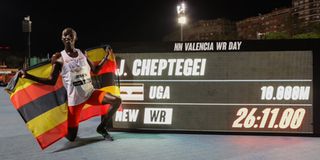Innovation or manipulation? Track technology continues unabated

Ugandan Joshua Cheptegei poses with the clock after setting a new world record in the 10,000 metres in Valencia, Spain on October 7, 2020.
What you need to know:
- Ugandan Joshua Cheptegei smashed the men's 10,000m world record on Wednesday, slicing an astonishing six seconds off the mark set in 2005 by Kenenisa Bekele.
- Cheptegei's performance came after Ethiopia's Letesenbet Gidey chalked off an equally remarkable four seconds from the previous record for the women's 5,000m set by Tirunesh Dibaba in 2008.
Paris
The unwavering advance of technology continues unabated in athletics as two long-standing world records were obliterated within an hour at the same meeting by runners wearing Nike's controversial track spikes and guided by trackside pacemaking lights.
At a near-empty stadium in the Spanish city of Valencia because of coronavirus restrictions, Ugandan Joshua Cheptegei smashed the men's 10,000m world record on Wednesday, slicing an astonishing six seconds off the mark set in 2005 by Kenenisa Bekele.
Cheptegei's performance came after Ethiopia's Letesenbet Gidey chalked off an equally remarkable four seconds from the previous record for the women's 5,000m set by Tirunesh Dibaba in 2008.

Ethiopian Letesenbet Gidey poses with the clock after setting a new women's 5,000m world record of 14 minutes 6.62 seconds. in Valencia, Spain on October 7, 2020. Gidey on June 8, 2021 broke the women's 10,000m world record.
Two world records in highly competitive events set in one heady hour did not just come about by accident.
They were premeditated and both performances factored in the latest technological advances, something that threatens a rash of new marks, just as swimming saw its record book rewritten with the introduction of the full-body suits -- that were later banned.
Both Cheptegei and Gidey were wearing Nike ZoomX Dragonfly spikes, containing a carbon plate and a unique foam which lend a propulsive sensation to every stride.
Critics claim the new shoes are the equivalent of mechanical doping, while supporters hail them as a revolutionary technical advance in footwear after decades of stagnation.
The spikes, nevertheless, are approved by World Athletics, track and field's governing body.
Not only were the two athletes wearing the controversial Nike spikes, but they had a team of pacemakers around them who utilised Wavelight technology - a trackside visual time guidance system which lights up to indicate the desired world record pace.
It guarantees metronomic pacing and it looks like a system that is here to stay. Just last month Briton Mo Farah and Ethiopian-born Dutch runner Sifan Hassan smashed the men and women's one-hour records, also wearing Nike shoes and using Wavelight.
Cheptegei's effort in the 10,000m caps a truly extraordinary year for the 24-year-old Ugandan, whose chains have been unshackled on the track following the Covid-19 enforced postponement of the Tokyo Olympics.
If they had gone ahead this year he would have doubtless been focusing on medals rather than seeking a string of world records.
Fresh from claiming the world cross country title in Denmark and world 10,000m track gold in Doha last year, Cheptegei sliced 1.99sec off Bekele's world 5,000m record, clocking a stunning 12:35.36 in Monaco in August.
That was preceded by a world record over the 5km road race, also in Monaco, in February.
After taking Bekele's 5,000m record in Monaco, Cheptegei insisted that technological advances were part and parcel of track, and it was up to each era of athletes to embrace them.
"We are in 2020," Cheptegei told letsrun.com. "We are not in 1980s, we are not in 1990s, we are not in 1970s.
"So every time, we have to accept the new developments in the sport, the new technology. You spoke about the Wavelight, you spoke about the watches, you spoke about the pacing, and yeah, even the shoes. We are really getting new innovations."
Cheptegei added: "It tells you that everything is special at every time - the spikes in 1980, the spikes that (Haile) Gebrselassie was using, the spikes that Kenenisa Bekele was using at that time, they were special at that time."





